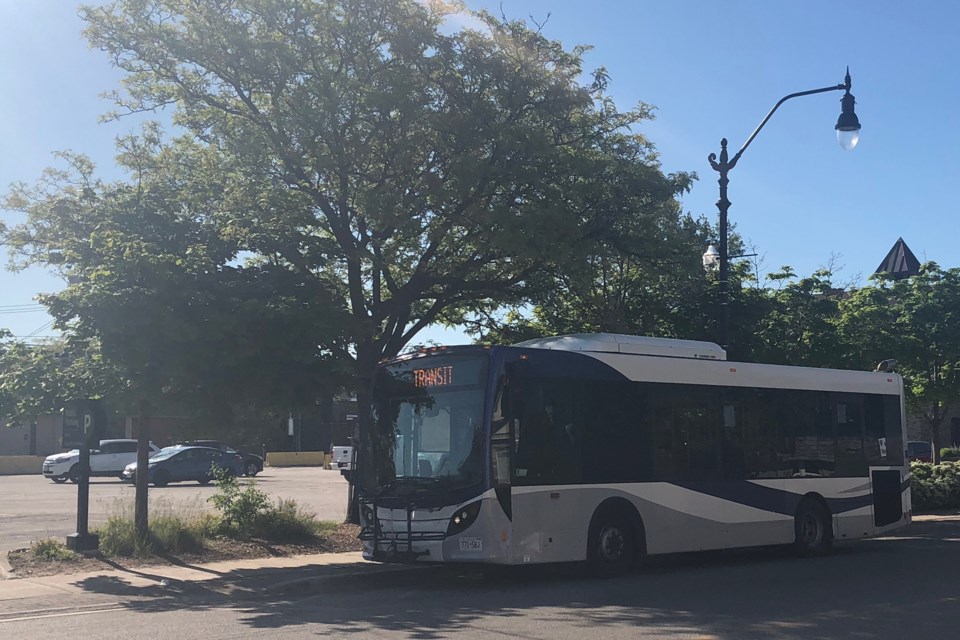You could soon be ordering a public bus to drive you around Collingwood.
During Monday night’s (Dec. 6) development and operations services standing committee meeting, councillors got a look at the public feedback and final recommendations from the Transit Service Review and Optimization Study, and voted unanimously to recommend implementing on-demand transit in Collingwood to coincide with a new transit contract, which would start in the summer of 2022.
Mayor Brian Saunderson noted Colltrans ridership numbers fell during the pandemic and haven’t bounced back.
“I believe this was the extra push that gets us into on-demand,” said Kris Wiszniak, operations and transit co-ordinator. “We haven’t seen a bounce-back like many other municipalities have seen. We’re seeing labour shortages in town, and that makes up a lot of our transit ridership.”
“I live in town. I see a lot of buses that don’t have people in them. I think the switch to on-demand is a logical choice,” he said.
The Town of Collingwood initiated a Transit Service Review and Optimization Study in early 2020 to undergo a detailed analysis of the Colltrans transit system. Collingwood’s last transit review was completed in 2006.
The consultants who are completing the review, IBI Group, also completed the previous review in 2006.
SEE MORE: Fare increase, on-demand service recommended for future of Collingwood transit
The study makes some key recommendations, including that the town adopt an on-demand service strategy as of July 1, 2022 to coincide with a new operating contract, and combine the conventional and specialized transit services into the same contract.
On-demand service would mean riders would book rides online in advance and buses would only be deployed for requested rides. The option to re-introduce regular routes into the service at a future date is still on the table under the on-demand system, should staff find certain routes are regularly full.
A switch to on-demand will also mean previously un-serviced areas in Collingwood’s south end will now be eligible to receive transit.
“I think it’s the most cost-effective way to be able to deliver services and deliver them to the whole municipality,” said Wiszniak.
Also as part of the review, a fare increase is also being recommended, to begin in April 2022. Specifically, the study recommends increasing individual rides from $2 to $2.50 and monthly passes from $40 to $50 by April 2022, and then increase them further to $3 for individual rides and $60 for a monthly pass within five years.
The consultant also recommends exploring a regional transit service between Collingwood, Blue Mountains, Wasaga Beach, Clearview and Stayner townships. It specifically suggests adding service between Nottawa and Collingwood, and Stayner and Collingwood.
Lastly, the study recommends assessing the feasibility of introducing battery electric buses to the fleet, and adding a full-time-equivalent staff position to manage technical support for the staff who currently manage the system.
The Town of Collingwood has been operating CollTrans since 1982. Over the past five years, until 2019, CollTrans served nearly 200,000 rides annually.
The staff report received by the committee indicates that ridership numbers for Colltrans have seen an average monthly decrease of 57.3 per cent from 2019 to 2021, while The Blue Mountains Link has seen an average monthly ridership decrease of 55.4 per cent.
According to the presentation provided by Wiszniak on Monday night, on-demand service is expected to decrease Colltrans fuel and maintenance costs by $35,000, and service contract costs by $49,000 annually.
Coun. Deb Doherty asked if the timeline of having the new system in place by July 2022 was reasonable.
“It seems like an aggressive schedule. Is it?” she asked.
Wiszniak said the intention is to implement the new system in conjunction with the new transit contract.
“It’s an ideal time to make the change over,” he said.
“Going to on-demand doesn’t mean we can’t go back to fixed route. It’s an extremely flexible system,” said Wiszniak. “In the event we see ridership jump again, we’ve got information from the on-demand system that would essentially plot out where our trip generators are.
“The level of ridership we’re at right now; it necessitates a change,” he said.
Decisions made at the development and operations standing committee will need to be ratified by council later in December before going into effect.
If the new system is approved by council later in December, a request for proposals for the on-demand platform would go out in January 2022, with full implementation expected by August 2022.



